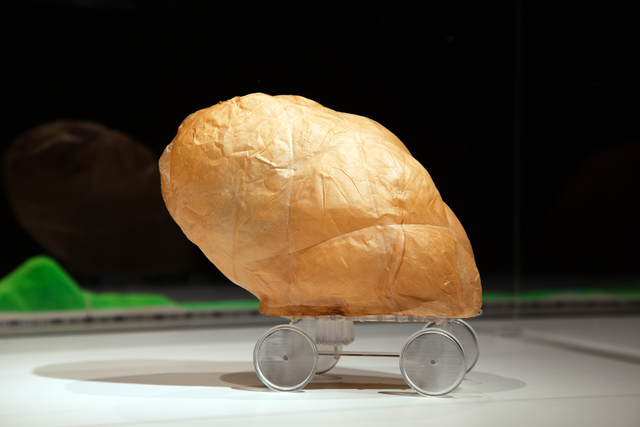Speculative privilege
‘In observing a little child, we find it is interested in everything and spontaneously apprehends, comprehends and co-ordinates an ever-expanding inventory of experiences’.* When I was a child, a branch wasn’t just a branch, it was a sword, a gun, and a magical staff all in one. As an adult, we are taught to lose this imaginatio. A branch is just a branch, how dare you imagine it is something else.
But this is exactly the imagination we need, to contradict that what we think is true. Once we step outside of our current framework, realize that it is not about the image but the content, we can start speculating about different possibilities that we could have never imagined within our current framework.
Take for instance the bio-car, part of Dunne & Raby’s United Micro Kingdoms. ‘Bioliberals regard the use of huge amounts of energy to overcome gravity and wind resistance to be counterproductive and primitive. Faster is no longer better. People travel in extremely light organically grown vehicles, each customised to its owner’s dimensions and needs. The bioliberal car combines two technologies: anaerobic digesters that produce gas, and fuel cells that use the gas to produce electricity’.**

It is not necessarily a desirable future but through the object, we can imagine how such a society would function. What are the desires, morals, and frameworks these bioliberals adhere to? It is not meant as a solution but should raise a discussion about the topics proposed.
This project has inspired me to look into alternatives outside of our current framework, making me speculate a bit more about life and our future. But it has also started a different kind of conversation about the topics proposed, one that was a bit different than I think Dunne & Raby intended. By doing research for my own project, I realized that many of these speculative futures are already happening. Many dystopias that we are imagining are already a reality in certain parts of the world and we take inspiration from those realities. Parts of India are already living on these proposed ‘‘technologies’’ as they have no access to the infrastructure that we do. They do not have the privilege to speculate, they have to act directly within their environments.
Theorizing is good and necessary, but when something stays within its theory or is not able to be tested against its context it doesn’t invite people to actually make a change. As stated before: once we lose our imagination there needs to be some catalyst that will bring this back. I believe that speculative design can help with that, as this project was also an inspiring force for me. But if it stays within its own theory, practice and galleries, it stays within an echo-chamber of people speculating about issues that are already happening worldwide. It doesn’t bring change, it just preaches to the choir. ‘Creating fiction about a new technology does not provide any agency to anyone. It merely presents a possibility, it doesn’t propose how to intervene it, or how to learn how to intervene in it.’***
However, once we are aware of our position within society, stop pretending that our consumption habits will change the world and acknowledge our privilege that makes it possible to speculate on problems without immediate action required, we can actually put our theories into action and we will be able to make a real change.
*Buckminster Fuller, Operating Manual for Spaceship Earth
